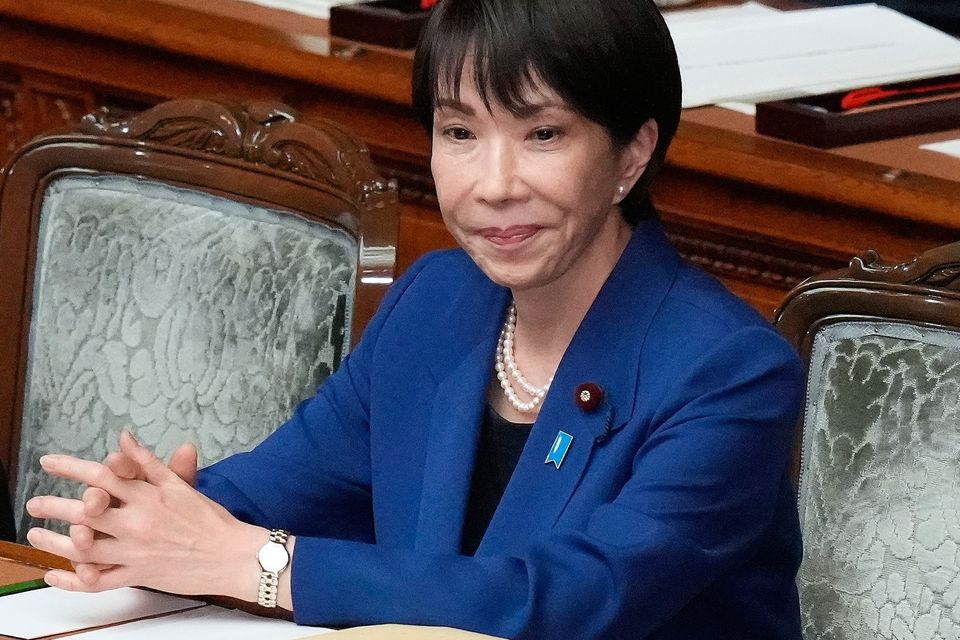World
Japanese Prime Minister Takaichi Reveals Sleep Deprivation Amid Criticism

Japanese Prime Minister Sanae Takaichi has disclosed that she typically sleeps for only two hours each night, raising alarms about the demands of her role and the broader implications of Japan’s work culture. This revelation follows a controversial meeting she held with aides at 3 a.m. last week, just hours before a scheduled appearance before the Japanese Parliament.
The early morning meeting, dubbed the “3 a.m. study session” by the media, took place just six hours prior to a budget committee hearing. Critics have expressed concerns that Takaichi’s extreme schedule exemplifies the troubling work culture pervasive in Japan, where overworking often leads to significant mental health issues and even fatalities. The phenomenon, known as karoshi, translates to “death from overwork” and has been linked to rising cases of stress-related deaths in recent years.
During a legislative committee hearing this week, Takaichi candidly addressed her sleep habits, stating, “I sleep about two hours now, four hours at the longest. It’s probably bad for my skin.” These comments came in response to inquiries regarding her plans to address Japan’s notoriously long working hours.
Since taking office as Japan’s first female prime minister on March 15, 2024, Takaichi has vowed to prioritize hard work, declaring her intention to “work, work, work, work and work.” However, this approach has attracted criticism, especially given the potential implications for her well-being and that of her staff.
In her defense, Takaichi explained that her home fax machine was malfunctioning, prompting her to travel to the official residence early in the morning to prepare for the day’s meetings. This incident underscores a long-standing issue in Japanese society, where employees are often expected to work excessive hours, frequently extending into social obligations after work.
The situation has sparked renewed discussions on the urgent need for reforms to improve work-life balance in Japan. Lawmakers and citizens alike are increasingly advocating for measures that address the detrimental effects of overwork. As Sanae Takaichi continues her tenure, her ability to balance the demands of leadership with personal health will be closely scrutinized, particularly in a nation grappling with the consequences of its rigorous work culture.
-

 Top Stories3 months ago
Top Stories3 months agoTributes Surge for 9-Year-Old Leon Briody After Cancer Battle
-

 Entertainment4 months ago
Entertainment4 months agoAimee Osbourne Joins Family for Emotional Tribute to Ozzy
-

 Politics4 months ago
Politics4 months agoDanny Healy-Rae Considers Complaint After Altercation with Garda
-

 Top Stories4 months ago
Top Stories4 months agoIreland Enjoys Summer Heat as Hurricane Erin Approaches Atlantic
-

 World5 months ago
World5 months agoHawaii Commemorates 80 Years Since Hiroshima Bombing with Ceremony
-

 Top Stories3 months ago
Top Stories3 months agoNewcastle West Woman Patricia Foley Found Safe After Urgent Search
-

 Top Stories5 months ago
Top Stories5 months agoFianna Fáil TDs Urgently Consider Maire Geoghegan-Quinn for Presidency
-

 World5 months ago
World5 months agoCouple Convicted of Murdering Two-Year-Old Grandson in Wales
-

 World5 months ago
World5 months agoGaza Aid Distribution Tragedy: 20 Killed Amid Ongoing Violence
-

 World5 months ago
World5 months agoAristocrat Constance Marten and Partner Convicted of Infant Murder
-

 Top Stories4 months ago
Top Stories4 months agoClimbing Errigal: A Must-Do Summer Adventure in Donegal
-

 Top Stories4 months ago
Top Stories4 months agoHike Donegal’s Errigal Mountain NOW for Unforgettable Summer Views









